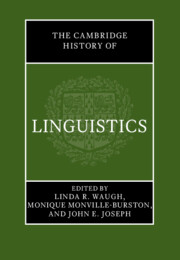Book contents
- The Cambridge History of Linguistics
- The Cambridge History of Linguistics
- Copyright page
- Dedication
- Contents
- Figures
- Tables
- Contributors
- Preface
- Acknowledgments
- Abbreviations, Acronyms, Special Symbols, and Other Conventions
- Introduction
- Part I Ancient, Classical, and Medieval Periods
- Part II Renaissance to Late Nineteenth Century
- Part III Late Nineteenth-through Twentieth-Century Linguistics
- Part IIIA Late Nineteenth Century through the 1950s: Synchrony, Autonomy, and Structuralism
- Part IIIB 1960–2000: Formalism, Cognitivism, Language Use and Function, Interdisciplinarity
- 17 Chomsky and the Turn to Syntax, Including Alternative Approaches to Syntax
- 18 Functionalist Dimensions of Grammatical and Discourse Analysis
- 19 Semantics and Pragmatics
- 20 Language and Philosophy, from Frege to the Present
- 21 Lexicology and Lexicography
- 22 Generative Phonology: its Origins, its Principles, and its Successors
- 23 Phonetics and Experimental Phonology, c. 1950–2000
- 24 Historical and Universal-Typological Linguistics
- 25 Language and Society
- 26 Language and Anthropology
- 27 Language and Psychology, 1950–Present: A Brief Overview
- 28 Semiotics
- 29 Applied Linguistics
- References
- Index
25 - Language and Society
from Part IIIB - 1960–2000: Formalism, Cognitivism, Language Use and Function, Interdisciplinarity
Published online by Cambridge University Press: 20 July 2023
- The Cambridge History of Linguistics
- The Cambridge History of Linguistics
- Copyright page
- Dedication
- Contents
- Figures
- Tables
- Contributors
- Preface
- Acknowledgments
- Abbreviations, Acronyms, Special Symbols, and Other Conventions
- Introduction
- Part I Ancient, Classical, and Medieval Periods
- Part II Renaissance to Late Nineteenth Century
- Part III Late Nineteenth-through Twentieth-Century Linguistics
- Part IIIA Late Nineteenth Century through the 1950s: Synchrony, Autonomy, and Structuralism
- Part IIIB 1960–2000: Formalism, Cognitivism, Language Use and Function, Interdisciplinarity
- 17 Chomsky and the Turn to Syntax, Including Alternative Approaches to Syntax
- 18 Functionalist Dimensions of Grammatical and Discourse Analysis
- 19 Semantics and Pragmatics
- 20 Language and Philosophy, from Frege to the Present
- 21 Lexicology and Lexicography
- 22 Generative Phonology: its Origins, its Principles, and its Successors
- 23 Phonetics and Experimental Phonology, c. 1950–2000
- 24 Historical and Universal-Typological Linguistics
- 25 Language and Society
- 26 Language and Anthropology
- 27 Language and Psychology, 1950–Present: A Brief Overview
- 28 Semiotics
- 29 Applied Linguistics
- References
- Index
Summary
Beginning with the connection between language and society and the history of social thought and linguistic theory, this chapter discusses the development of empirical work on variability in language use in social settings. It describes progress in sociolinguistics and how analysis of speech in relation to the social backgrounds of speakers in heterogeneous, stratified societies, e.g., their racial and ethnic affiliations, migration histories and power relations, relationships in multilingual settings, etc., rested on new methodologies and created new findings about linguistic diversity.
Guided by work on speech communities, sociolinguists found various patterns in the relation between language and society (including language change) by studying: ‘free variation’; language use in specific sociocultural settings (engendering ‘ethnography of communication’); language contact and pidgins/creoles; bi/multilingualism, language choice (engendering ‘sociology of language’) and code-switching; language use in diglossia (related to functional domains, social situation, interlocutor, subject matter, etc.).
Working with sociolinguistic variables, such as space, time, social class, ethnicity/race, sex/gender, and age, which constitute a complex object of multidimensional variability, the sociolinguist Labov found, e.g., that race/ethnicity and gender differences were more important than social class for language change in the USA.
Given these issues, the problem of identifying the linguistic system is complex and paramount.
Keywords
- Type
- Chapter
- Information
- The Cambridge History of Linguistics , pp. 782 - 805Publisher: Cambridge University PressPrint publication year: 2023

